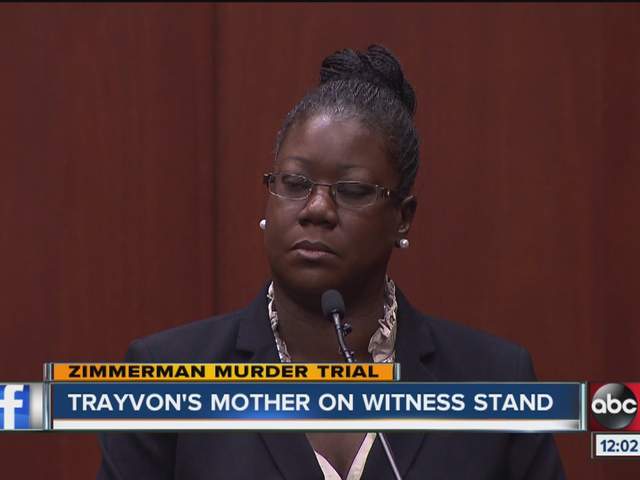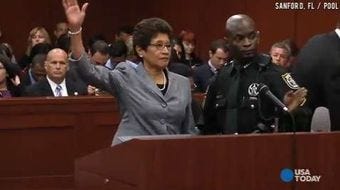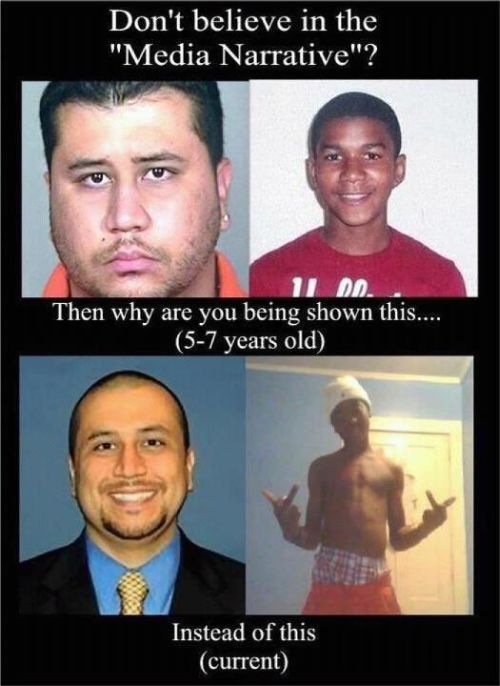I don't know how it is permissible for Trayvons mother and Georges to be able to get on the stand bc every trial I know that's not televised witnesses or those who testify aren't allowed in the courtroom, until after they testify so they can't change their story? Just saying.....
USDOJ:
Victim-Witness Program Witness Information
Tips for Testifying
- Tell the truth. This is the single most important advice any witness should remember. When you are called to testify, you will first be required to take an oath or affirmation to tell the truth. When you take the oath or affirmation, say "I do" clearly. When you are asked questions, every true fact should be readily admitted. Do not stop to figure out whether your answer will help or hurt either side. Just answer the questions to the best of your memory.
- Be prepared. You should know days or weeks ahead of time that you will be testifying. Before you testify, think about the incident and what happened, so that you can recall the details accurately when you are asked in court. If the question is about distances or time, and if your answer is only an estimate, be sure you say it is only an estimate. Beware of suggestions by attorneys as to distances or times when you do not recall the actual time or distance. Do not agree with their estimate unless you independently arrive at the same estimate.
- Speak in your own words. Don't try to memorize what you are going to say. Doing so will make your testimony sound rehearsed and unconvincing. Instead, just be yourself. Prior to the trial or hearing, go over in your own mind those matters about which you will be questioned.
- Dress neatly. There is no dress code in a courtroom. However, it is important to have a neat appearance, and to dress in a manner that shows respect for the courtroom proceedings. An appearance that seems very casual or overly dressy may distract the jury during the brief time you are on the stand, and they may not concentrate on your testimony. Hats should not be worn in the courtroom.
- Avoid distracting mannerisms while testifying.Avoid chewing gum, candy, or other objects that may make you difficult to understand. Present your testimony clearly, slowly, and loud enough so that the juror seated farthest away from you can easily hear and understand everything you say.
- Do not speak to jurors or discuss the case outside of the courtroom. Jurors who are or will be sitting on the case in which you are a witness may be present in the same public areas of the courthouse where you will be. For that reason, you should not discuss the case with anyone. Remember, too, that jurors may have an opportunity to observe how you act outside the courtroom. If you see a juror, you are not allowed to speak to the juror, even to say hello.
- Conduct yourself in a dignified manner. From the moment you enter the courtroom or courthouse, your behavior should be appropriate to the seriousness of the proceedings. When you are called into court for any reason, be serious and avoid saying anything about the case until you are actually on the witness stand. Also, do not read in the courtroom, unless asked to do so by the judge or the attorneys.
- Do not exaggerate or guess. Don't make overly broad statements that you may have to correct. Be particularly careful in responding to a question that begins, "Wouldn't you agree that...?" The explanation should be in your own words. Do not allow an attorney to put words in your mouth. Give positive, definite answers when at all possible. Avoid saying "I think," "I believe," or "In my opinion." If you do not remember certain details, it is best to say that you don't remember. If you don't understand the question, say so. Don't make up an answer.
- Expect to be questioned by several people. One of the basic rules in a criminal case is that both sides have a chance to question every witness. Questions asked by both sides have the same goal - to find out what is true. When a witness gives testimony, he or she is first asked some questions by the lawyer who called the witness to the stand. If you have been called by the U.S. Attorney's Office, this attorney is the Assistant United States Attorney (AUSA). This is called the "direct examination." The witness is then questioned by the defense lawyer in "cross examination." Sometimes the process is repeated two or three times to help clear up any confusion. The basic purpose of direct examination is for you to tell the judge and jury what you know about the case. The basic purpose of cross-examination is to raise doubts about the accuracy of your testimony. If you feel you are being doubted in cross-examination, remember that to raise doubt is the defense counsel's job. Try not to take questions personally or be upset by an attorney's questions. Always be courteous, even if the lawyer questioning you appears discourteous. A witness who is angry or upset may appear to be less than objective. Do not appear to be a "wise guy" or you will lose the respect of the judge and the jury. If you are testifying before the grand jury, there will not be a defense attorney present. However, you may be asked questions by members of the grand jury.
- Jurors are ordinary people, just like you. Although you are responding to the questions of a lawyer, remember that the questions and answers are really for the jury's benefit. Jurors are the ones who decide the facts of the case. Always speak clearly and loudly, so that every juror can hear you.
- Listen carefully to the questions that you are asked. Understand the question (have it repeated, if necessary), then give a thoughtful, considered answer. Do not give an answer without thinking. While answers should not be rushed, neither should there be an unnaturally long delay to a simple question if you know the answer.
- Answer the questions verbally. Do not nod your head for a "yes" or "no" answer. Speak out loud, so that the court reporter can hear the answer. For the same reason, try to avoid words like "yah," "nope," and "uh-huh."
- Answer only the questions asked. Do not volunteer information which has not actually been asked of you. If you don't understand the question asked by one of the attorneys, ask the attorney to repeat or rephrase the question so that you understand exactly what is being asked.
- Answer all questions to the point. If the question cannot be truthfully answered with a simple "yes" or "no," ask to explain your answer. If your answer was not correctly stated, correct it immediately. If your answer was not clear, clarify it immediately. If you realize you have answered incorrectly, say, "May I correct something I said earlier?"
- Stick to the facts. The judge and the jury are interested in the facts that you have observed or about which you have personal knowledge. Therefore, don't give your conclusions and opinions, and don't state what someone else told you, unless you are specifically asked. Unless certain, don't say "That's all of the conversation" or "Nothing else happened." Instead, you might say, "That's all I recall" or "That's all I remember happening." It may be that after more thought or another question, you will remember something important.
- Mistakes happen. Sometimes, witnesses give inconsistent testimony - something they said before doesn't agree with something they said later. If this happens to you, don't get flustered. Just explain honestly whey you were mistaken. The jury, like the rest of us, understands that people make honest mistakes.
- Follow the judge's instructions at all times. Stop instantly when the judge interrupts you, or when an attorney objects to a question, and wait for the judge to tell you to continue.
- Don't start to answer a question until the question is finished. If you haven't heard the entire question, you don't really know what you are being asked. In addition, sometimes an attorney may raise an objection to the question being asked. "Objection" is a legal term that means one of the attorneys feels you are being asked an improper kind of question. When you hear a lawyer say "objection," simply stop speaking and wait for the judge to rule on the objection. If the judge decides the question is proper, he or she will overrule the objection. If the judge decides the question is not proper, he or she will sustain the objection. You will be told either by the judge or the attorney whether to go ahead and answer the question. Sometimes the judge and attorneys will need to talk just amongst themselves. A "sidebar" is when the judge and the attorneys meet at the judge's bench to discuss various matters, including technical disputes over the Federal Rules of Evidence. They meet at the judge's bench so that the jury cannot hear their discussion.
- Do not talk about your testimony with other witnesses. After a witness has testified in court, he or she should not tell other witnesses what was said during the testimony until after the case is over. Do not ask other witnesses about their testimony, and do not volunteer information about your own. Sometimes an attorney may ask if you have talked to anybody about the case. It is perfectly proper for you to have talked to people before you testified, such as the prosecutor or your family or friends, and you should respond truthfully to this question




No comments:
Post a Comment